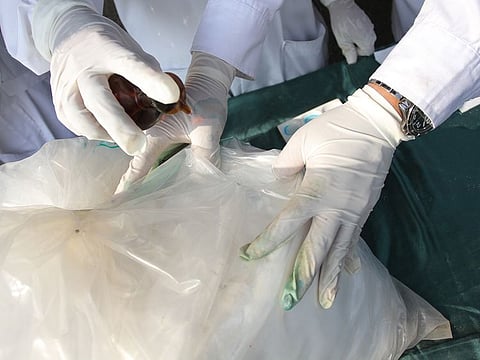Kuwait approves harsh new anti-drug law: Random testing, death penalty for traffickers
New law mandates drug tests for employees, drivers, marriage applicants and athletes

Dubai: Kuwait’s Cabinet has approved a comprehensive new anti-narcotics law that introduces random drug testing for military and civilian employees, mandatory testing for driver’s licence and marriage applicants, and strict penalties for drug-related crimes, including the death penalty in the most serious cases.
According to the state-run news agency KUNA, the revised law — approved at a Cabinet meeting chaired by Prime Minister Sheikh Ahmad Al Abdullah Al Sabah — will be submitted to Emir Sheikh Mishal Al Ahmad Al Jaber Al Sabah for endorsement.
The amended legislation consolidates two previous laws — Law No. 74 of 1983 on combating narcotics and Law No. 48 of 1987 on psychotropic substances — to form a unified framework that closes procedural loopholes blamed for past acquittals.
It establishes tougher penalties, including execution or life imprisonment for traffickers, dealers and intermediaries, alongside fines of up to two million dinars.
'Comprehensive war on drugs'
Described by officials as a “comprehensive war on drugs,” the revised law introduces preventive, therapeutic and punitive provisions unprecedented in other jurisdictions. It authorises random drug tests for public employees, both military and civilian, to ensure continued fitness for service.
Recent major drug busts in Kuwait
Half-million Captagon pills seized: Kuwait’s General Department for Drug Control arrested two illegal residents, confiscating 500,000 Captagon pills, 100,000 Lyrica capsules, and two firearms with ammunition after intelligence from a neighbouring country exposed the smuggling plot.
Prison-based trafficking network dismantled: Authorities broke up Kuwait’s largest known psychoactive drug network, seizing over 800,000 Lyrica capsules and arresting multiple suspects.
The main ringleader, a Kuwaiti national, was operating from inside Central Prison, coordinating smuggling and distribution from behind bars.Methanol poisoning ring busted: Police arrested 65 people, including 30 women, tied to a gang producing and selling toxic methanol that caused the deaths of several Asian workers.
An Asian suspect was found with quantities of methanol during field raids.Joint Kuwait–UAE maritime operation: Security forces foiled a sea-based smuggling attempt, seizing 110 kilos of narcotics — 100 kg of crystal meth and 10 kg of heroin — in a coordinated cross-border operation.
The law also empowers the Minister of Health to include drug screening in premarital medical checks and the Minister of Interior to add it to driver’s licence and firearms-permit requirements.
Refusing a drug test could lead to imprisonment of up to four years, except for marriage applicants and students, while police have been granted immediate arrest powers for suspected users.
The law further mandates compulsory hospitalisation for addicts under police supervision until recovery, with separate prisons for drug offenders.
The legislation prescribes death sentences in four categories, including for anyone supplying drugs to minors, exploiting an official position to traffic narcotics, or bartering drugs for favours.
It also imposes 10-year prison terms for athletes using stimulants and three-year terms for anyone inciting or facilitating drug use, even indirectly.
Officials said the law aims to unify terminology, standardise enforcement and strengthen prevention, treatment and deterrence within a single, robust legal framework to protect society from narcotics.
Sign up for the Daily Briefing
Get the latest news and updates straight to your inbox


